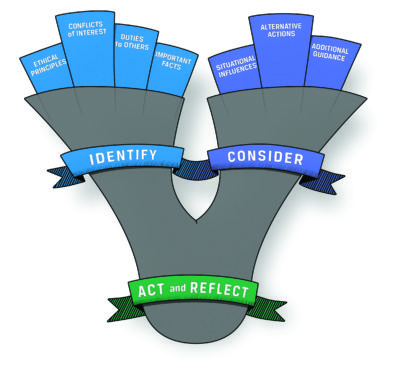Ethics in Practice: Corporate Disclosure. Case and Analysis–Week of 4 February
Check out the analysis to see how you did in analyzing this week’s case (4 February) and determining which CFA Institute Standard was involved.
Case
Huang is the CEO and an executive director of GLB Group, a diversified company engaged in the business of securities investment and finance. The company’s shares have been listed on the Stock Exchange of Hong Kong (SEHK) for the past two decades. Huang circulates the unaudited financial statements for the past fiscal year to the company’s board of directors. The financial statements show a substantial increase in profitability over the previous fiscal year. Shortly after Huang provides this information to the board of directors, dramatic movements are seen in the trading volume and price of GLB stock.
Relying on his obligation under the CFA Institute Code of Ethics and Standards of Professional Conduct to keep employer information confidential, act with diligence, and have a reasonable and adequate basis for investment actions, Huang decides to wait for the audited financial statements to be prepared before releasing the statements publicly. Three weeks later, after the audited financial statements are ready, GLB issues a profit alert that states GLB expects a sharp turnaround of its results for the year, mainly attributable to the substantial net gains of its investments. Following publication of the profit alert, the share price of the company jumps 24%.
Huang’s actions are
- inappropriate.
- appropriate because the unaudited financial statements are confidential GLB information.
- appropriate because he waited for the financial statements to be finalized prior to making a public disclosure.
- appropriate if he cautioned the directors not to share the information publicly.
- none of the above.
Analysis
This case relates to knowledge of regulations relating to the disclosure of corporate information. CFA Institute Standard I(A): Knowledge of the Law states that CFA Institute members must comply with all applicable laws governing their professional activities and, in the event of a conflict, must comply with the more strict law. Because GLB’s stock is listed on the SEHK, the rules and regulations governing that exchange are applicable to it and to Huang. Securities Futures Ordinance Section 307 requires that, once information related to fiscal year performance comes to the knowledge of a company, the information must be publicly disclosed to the market as soon as reasonably practicable.
In this case, the disclosure did not take place until several weeks later. Failure to ensure timely disclosure resulted in a breach of SEHK regulations. Huang waited to receive the finalized financial statements before making an announcement, thinking his actions were appropriate in fulfilling his duties under the CFA Institute Code of Ethics and Standards of Professional Conduct. Even if this was a proper interpretation of his responsibilities under the standard, the legal requirement of prompt disclosure, as the stricter rule, trumps the provisions of the applicable CFA Institute standards. Choice A is the best answer
This case is based on a November 2018 enforcement action by the Hong Kong Securities and Futures Commission.
Let us know what you think of Ethics in Practice by taking this short survey.
Have an idea for a case for us to feature? Send it to us at [email protected].
More About the Ethics in Practice Series
Just as you need to practice to become proficient at playing a musical instrument, public speaking, or playing a sport, practicing assessing and analyzing situations and making ethical decisions develops your ethical decision-making skills. The Ethics in Practice series gives you an opportunity to “exercise” your ethical decision-making skills. Each week, we post a short vignette, drawn from real-world circumstances, regulatory cases, and CFA Institute Professional Conduct investigations, along with possible responses/actions. We then encourage you to assess the case using the CFA Institute Ethical Decision-Making Framework and through the lens of the CFA Institute Code of Ethics and Standards of Professional Conduct. Then join the conversation and let us know which of the choices you believe is the right one and explain why. Later in the week, we will post an analysis of the case and you can see how your response compares.
Image Credit: ©CFA Institute

